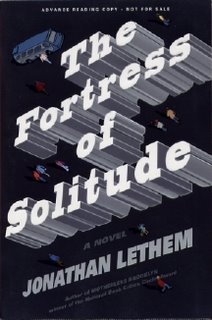
If "Motherless Brooklyn" was a quick compact read, this was not. I had to renew this bloody book twice. Then because my cat died, I was late renewing a third time and the library refused to renew it, as it’s now considered overdue. (see my Rant in wordsmiths) So I said, fuck this, it took me almost 3 months to read this tome, I’ll pay the 25 cents per day until I goddamn finish it!
"The Fortress of Solitude" has everything: epic coming of age tale, homage to a bygone Brooklyn; elements of magic realism, comic book fantasy, multicultural mish-mash, pop culture commentary and social critique. It’s kind of like a Brooklyn-ized version of "White Teeth" (Zadie Smith), or "Midnight’s Children" (Salman Rushdie). However, the core of the novel is the unlikely (yet likely) friendship between a black kid named Mingus and a white kid named Dylan.
Although rich in period detail and mood, I found it overly expository at times. It made for a tough read, especially at the beginning, due to lack of narrative momentum and its mellow chronological pacing. It began with Dylan as a young boy adjusting to a mostly black and Hispanic Brooklyn neighbourhood. Each section was devoted to a grade, or season, of Dylan’s life until he finally reaches high school.
When it dawned on me that every densely paragraphed chapter was going to represent a year of his teenaged life, I knew it was going to be a long haul. But even as I was tempted to skim through expounding paragraphs, there were worthy details I didn’t want to miss. TFoS is the kind of book that’s got enough cool shit that a former-geekboy-turned-hipster reader would perhaps devour and reminisce about.
Take this quote for instance:
Mingus Rude excavated four comic books from the closet floor: Daredevil #77, Black Panther #4, Doctor Strange #12, The incredible Hulk #115. They’d been tenderly handled to death, corners rounded, paper browned by hot attentive breath, pages chewed by eyes.
You can just tell that Lethem loves, even almost fetishizes, this kind of stuff!
And despite being a gawky white kid, Dylan’s privy to the cultural trends of his era. Through him, you get to experience childhood in the 1960’s, a time when kids hung out and played spaldeen on the street. During the adolescent 70’s, the two boys discover the world of comic books (and superpowers, even!). Through Mingus, Dylan gets exposed to hiphop and the delinquent pastimes of shoplifting, getting stoned and territorial tagging. When their friendship becomes estranged, he befriends geeks who memorize Al Jaffe’s Snappy Answers to Stupid Questions and spout lines from Monty Python. Then Dylan goes punk, catching shows at CBGB’s and dealing LSD on the Bowery.
Dylan eventually becomes a music journalist, while Mingus takes the more stereotypical and tragically “black” path via Requiem for a Dream-like descent into drug addiction, crime and prison sentences at Spofford, Riker’s, Elmira, and finally, Watertown.
Highlights in the book are the protagonists’ respective dads. Dylan’s father is a failed artist-filmmaker who fell into painting sci-fi paperback covers for a living. Lethem has a knack for finding humour in the sci-fi subculture, as Abraham Ebdus, much to his chagrin, finds semi-success at what he does, winning Nebula awards and spots as a guest speaker on esoteric panels. The background of Mingus’ father is less thought out. The background of Barrett Rude Jr’s musical career has its own chapter awkwardly inserted near the end of the novel instead of woven through the book. It’s a fascinating rise and fall account, but interferes with the flow of the narrative.
Jonathan Lethem is definitely one of the more original and interesting contemporary writers, and he’s got a wonderful way with words. It’s no easy feat to deftly weave (almost) so many disparate elements together. TFoS is a flawed woult-be masterpiece only because it tries to capture and chronicle so much.
3 comments:
Why the heck is it called Fortress of Solitude? It seems like an inappropriate name.
Great review!
Thanks, Crumbolst. The title makes sense once you read the book, which ties into its central themes.
The novel's protagonists are obsessed with comics at a young age, and the novel's title is a reference to Superman's retreat in the North Pole. I think more significantly, the title suggests the icy distances that can develop between various relationships: father/son, wife/husband, friend/friend, etc.
Nice review. Interestingly when I was at my local used bookstore last week, chatting with one of the book nerds, he recommended a title by this author. Our conversation was about the post apocalyptic genre, and he recommended a book called Amnesia Moon. He said that Lethem was one of his favorite authors these days. And that every book he wrote was quite different from the last. I had never heard of the guy, but I will try to pick up the title.
Post a Comment